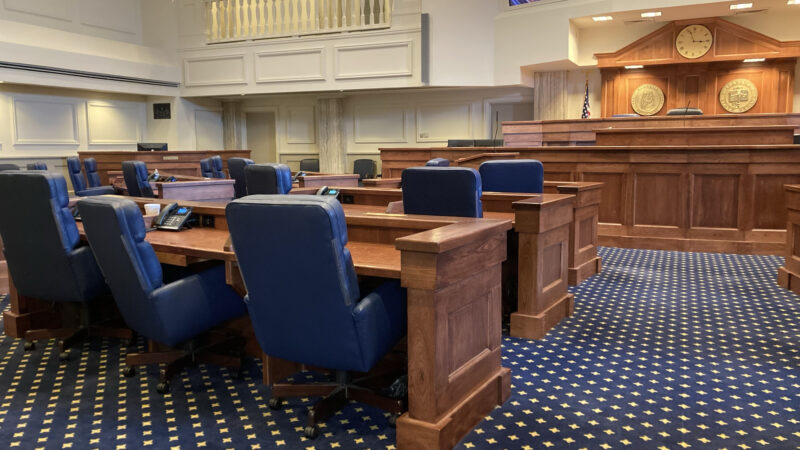Special session underway on spending federal pandemic funds
Alabama lawmakers began the 2023 regular legislative session on Tuesday. A day later, they were in a special session called by Gov. Kay Ivey to decide how to spend about $1 billion in federal pandemic relief funds. Legislators appropriated the first half of the money from the American Rescue Plan Act (ARPA) last year, and they also did it via a special session within the regular session.
“It’s essentially a useful tactic by the governor, and I guess you could include top legislative leaders, to isolate an issue in order to get it passed in a more efficient manner,” said Todd Stacy, host of Capitol Journal on Alabama Public Television.
Stacy discussed the special session and Gov. Ivey’s spotlight on education for this week’s legislative wrap up.
How to spend a billion dollars?
In a special session, lawmakers are mostly limited to considering issues declared by the governor. That narrows the focus and streamlines the process by preventing the typical back-and-forth among legislators.
“Let’s say … they were taking up this ARPA money in the regular session. You would have other competing bills with the potential to horse-trade,” Stacy said. “They really don’t want a bill like this, these funds, to be subject to that kind of horse-trading and things.”
The proposed spending plan would steer:
— $339 million for healthcare costs, including $100 million to reimburse hospitals for pandemic-related expenses, $100 million to reimburse nursing homes and $25 million to support mental health programs and services
— $400 million for water and sewer infrastructure projects
— $260 million for improvement and expansion of broadband network access
— $55 million for projects that address economic impacts of the pandemic: The legislation says the Department of Finance may distribute the money for a wide range of programs, like food banks, housing and child welfare programs.
“It really looks a lot like what they did with the first round of ARPA funds,” Stacy said.
The previous round did spur controversy when the Republican majority appropriated $400 million dollars toward building two new mega-prisons. Stacy said federal rules are much stricter around the current round of money. He expects much less controversy.
One other bill is under consideration during the special session. It would authorize a $60 million dollar payment to the Alabama Trust Fund, a state savings account. This would finish repaying $437 million lawmakers and voters approved borrowing from the fund to avoid budget cuts in 2012. The repayment comes from state revenue and not ARPA money.
Focus on Education
Ivey delivered her state of the state address Tuesday, and a notable portion addressed education.
“She probably devoted more time to that issue than any other issue in the speech,” Stacy said. “That really struck me.”
Ivey had said in her inaugural address in January she wanted Alabama to be in the top 30 U.S. states in reading and math standardized test scores. Stacy said this week’s speech indicated part of that effort will involve additional resources for the Alabama Literacy Act and Alabama Numeracy Act along with further support for charter schools.
“I think a lot of education policy folks appreciate the challenge and are eager to get started trying to make some of these improvements,” Stacy said.
Includes reporting from the Associated Press
40 years after ‘Purple Rain,’ Prince’s band remembers how the movie came together
Before social media, the film Purple Rain gave audiences a peak into Prince’s musical life. Band members say the true genesis of the title song was much less combative than the version presented in the film.
Park Fire in California could continue growing exponentially, Cal Fire officer says
Cal Fire has confirmed that over a hundred structures have been damaged in the Park Fire, which grew overnight near Chico, Calif. Difficult firefighting conditions are forecast through Friday night.
Checking in with Black voters in Georgia about the election, now that Biden is out
Some voters who could be key to deciding who wins Georgia. What do they think about Vice President Harris becoming the frontrunner in the race to be the Democratic nominee?
Tahiti’s waves are a matter of ‘life and death’ for surfing Olympics
Tahiti's Teahupo'o wave has a slew of riders for the Paris 2024 Olympics. NPR finds out why it's called one of the most dangerous waves.
Researchers are revising botanical names to address troubling connotations
Since the mid-1700s, researchers have classified life with scientific names. But some of them have problematic histories and connotations. The botanical community is trying to tackle this issue.
A spectacular opening ceremony wowed a global audience despite Paris’ on-and-off rain
The Paris Olympics opening ceremony wowed Parisians, fans and most everyone who was able to catch a glimpse of thousands of athletes floating down the Seine to officially begin the Games.



